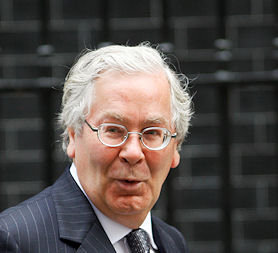Mervyn King tells TUC: deficit must be cut
The governor of the Bank of England, Mervyn King, blames bankers, policy makers and the Labour government for the financial crisis, writes Channel 4 News economics editor Faisal Islam.

Mr King told union delegates at the TUC conference that policy makers and the financial sector had “let it slip” after years of growth. But he argued that the budget deficit had to be cut.
With unions preparing for a wave of protests and industrial action over the government’s plans to cut public spending by 25 per cent, Mr King said: “We cannot afford to put it off and hope for the best.”
On the deficit, he told the conference in Manchester that Britain was sitting on the “biggest peacetime budget deficit in history”, and although it had to be dealt with, it was for the government to decide how to do so. It was not his job to make a decision on whether the bulk of the deficit should be reduced by spending cuts or tax increases.
‘We let it slip’
Mr King, who is only the second Bank governor to address the TUC, said: “Recent times have indeed been turbulent. After a decade-and-a-half of stability, with rising employment and living standards, came the crisis and recession – the biggest economic upheaval since the Great Depression.
“Before the crisis, steady growth with low inflation and high employment was in our grasp. We let it slip – we, that is, in the financial sector and as policy-makers – not your members, nor the many businesses and organisations around the country which employ them.
“And although the causes of the crisis may have been rooted in the financial sector, the consequences are affecting everyone, and will continue to do so for years to come.”
In saying "we let it slip", he pinned blame for the crisis on bankers and policymakers, and, by extension, the Labour government, writes economics editor Faisal Islam. It is the closest to a mea culpa I have ever heard from this proud self-confident academic.
Even the word 'bank' seemed to send some union delegates into an eye-bulging tizzy. It is a shame, because on bank reform they have been surprised to hear just how much common cause Mervyn King has with the band of union brothers.
Read more of Faisal's blog.
He acknowledged that many people were angry about the bank bailouts. “The banks were bailed out, not to protect them, but to protect the rest of the economy from the banks.
“There was nothing fair about the financial crisis. It was caused not by problems in the real economy. It came out of the financial sector, but it was the real economy that suffered and the banks that were bailed out.”
Mr King said a million more people were out of work now than before the recession, but unemployment was lower than many had forecast.
Unemployment falls
Official figures released today also show there has been a small fall in unemployment, with 8,000 fewer people out of work.
Unemployment fell to 2.47 million in the three months to July. But the claimant count - those receiving unemployment benefit - rose by 2,300 to 1.47 million.
“Your members, and indeed the businesses which employ them, are entitled to be angry. But however legitimate, anger will not produce change unless its energy is harnessed to a cool analysis of what happened and why.”
Crow boycott
Bob Crow, general secretary of the Rail Maritime and Transport union, decided to boycott the speech, saying it was like Christians asking the “devil” to address them.
“This is our congress and I don’t think he should have been invited,” he said. “He is on the side of the bosses – he is not welcome here. You would never see the Conservatives inviting a union general secretary to their conference.
“I haven’t heard him offer much support to school dinner ladies, nurses or other public sector workers in the campaign against spending cuts.”
‘Public protector’
Before standing up in Manchester, Mr King struck an emollient tone in an interview published in the conference guide, saying he saw one of his roles as protecting the public from the banks.
He said he sympathised with public anger about the financial crisis, adding: “The origins of previous recessions could be traced to the need to combat inflation. This involved high interest rates, which inevitably affected businesses and jobs. But we have had the restructuring of industry, labour markets are more flexible and inflation is not the problem it was. People have a right to be puzzled.
“The unions have made concessions during previous recessions, so why should they suffer now? The role of the Bank of England changed with independence. It was an apologist for the City. I now see it serving the nation as a whole.”
Public/private sector payMr King's speech coincided with new research suggesting that public sector workers are paid more on average than those in the private sector. The survey, by the Office of National Statistics, says median gross pay for all full-time workers in the public sector is £539 a week, compared with £465 in the private sector. When pensions are added, the total figures for the public and private sectors are £615 and £479 respectively.
But when only employees with pensions are surveyed, it is a different picture: median total remuneration in the private sector is higher, at £666 a week, compared with £644 for those in the public sector.
The report's author Sarah Levy said: "For some time, people have been talking about differences in pay and pensions between the private and public sectors. This article provides hard evidence from a major UK survey."